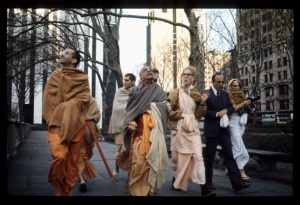SB 3.33.15: Difference between revisions
m (1 revision(s)) |
No edit summary |
||
| Line 1: | Line 1: | ||
{{info | {{info | ||
|speaker=Maitreya | |speaker=Maitreya Ṛṣi | ||
|listener=Vidura | |listener=Vidura | ||
}} | }} | ||
[[Category:Srimad-Bhagavatam - Canto 03 Chapter 33]] | |||
[[Category:Bhagavatam Verses Spoken by Maitreya Rsi - Vanisource|033315]] | |||
<div style="float:left">'''[[Srimad-Bhagavatam]] - [[SB 3|Third Canto]] - [[SB 3.33: Activities of Kapila|Chapter 33: Activities of Kapila]]'''</div> | |||
<div style="float:right">[[File:Go-previous.png|link=SB 3.33.14]] '''[[SB 3.33.14]] - [[SB 3.33.16]]''' [[File:Go-next.png|link=SB 3.33.16]]</div> | |||
{{RandomImage}} | |||
==== TEXT 15 ==== | ==== TEXT 15 ==== | ||
<div | <div class="verse"> | ||
prajāpateḥ kardamasya | :prajāpateḥ kardamasya | ||
tapo-yoga-vijṛmbhitam | :tapo-yoga-vijṛmbhitam | ||
sva-gārhasthyam anaupamyaṁ | :sva-gārhasthyam anaupamyaṁ | ||
prārthyaṁ vaimānikair api | :prārthyaṁ vaimānikair api | ||
</div> | </div> | ||
| Line 16: | Line 22: | ||
==== SYNONYMS ==== | ==== SYNONYMS ==== | ||
<div | <div class="synonyms"> | ||
prajā- | ''prajā-pateḥ''—of the progenitor of mankind; ''kardamasya''—Kardama Muni; ''tapaḥ''—by austerity; ''yoga''—by ''yoga''; ''vijṛmbhitam''—developed; ''sva-gārhasthyam''—his home and household paraphernalia; ''anaupamyam''—unequaled; ''prārthyam''—enviable; ''vaimānikaiḥ''—by the denizens of heaven; ''api''—even. | ||
</div> | </div> | ||
| Line 23: | Line 29: | ||
==== TRANSLATION ==== | ==== TRANSLATION ==== | ||
<div | <div class="translation"> | ||
The home and household paraphernalia of Kardama, who was one of the Prajāpatis, was developed in such a way, by dint of his mystic powers of austerity and yoga, that his opulence was sometimes envied by those who travel in outer space in airplanes. | The home and household paraphernalia of Kardama, who was one of the Prajāpatis, was developed in such a way, by dint of his mystic powers of austerity and yoga, that his opulence was sometimes envied by those who travel in outer space in airplanes. | ||
</div> | </div> | ||
| Line 30: | Line 36: | ||
==== PURPORT ==== | ==== PURPORT ==== | ||
<div | <div class="purport"> | ||
The statement in this verse that Kardama Muni's household affairs were envied even by persons who travel in outer space refers to the denizens of heaven. Their airships are not like those we have invented in the modern age, which fly only from one country to another; their airplanes were capable of going from one planet to another. There are many such statements in the Śrīmad-Bhāgavatam from which we can understand that there were facilities to travel from one planet to another, especially in the higher planetary system, and who can say that they are not still traveling? The speed of our airplanes and space vehicles is very limited, but, as we have already studied, Kardama Muni traveled in outer space in an airplane which was like a city, and he journeyed to see all the different heavenly planets. That was not an ordinary airplane, nor was it ordinary space travel. Because Kardama Muni was such a powerful mystic yogī, his opulence was envied by the denizens of heaven. | The statement in this verse that Kardama Muni's household affairs were envied even by persons who travel in outer space refers to the denizens of heaven. Their airships are not like those we have invented in the modern age, which fly only from one country to another; their airplanes were capable of going from one planet to another. There are many such statements in the [[Srimad-Bhagavatam|''Śrīmad-Bhāgavatam'']] from which we can understand that there were facilities to travel from one planet to another, especially in the higher planetary system, and who can say that they are not still traveling? The speed of our airplanes and space vehicles is very limited, but, as we have already studied, Kardama Muni traveled in outer space in an airplane which was like a city, and he journeyed to see all the different heavenly planets. That was not an ordinary airplane, nor was it ordinary space travel. Because Kardama Muni was such a powerful mystic ''yogī'', his opulence was envied by the denizens of heaven. | ||
</div> | </div> | ||
__NOTOC__ | |||
<div style="float:right; clear:both;">[[File:Go-previous.png|link=SB 3.33.14]] '''[[SB 3.33.14]] - [[SB 3.33.16]]''' [[File:Go-next.png|link=SB 3.33.16]]</div> | |||
__NOTOC__ | |||
__NOEDITSECTION__ | |||
Revision as of 02:36, 11 May 2021

A.C. Bhaktivedanta Swami Prabhupada
TEXT 15
- prajāpateḥ kardamasya
- tapo-yoga-vijṛmbhitam
- sva-gārhasthyam anaupamyaṁ
- prārthyaṁ vaimānikair api
SYNONYMS
prajā-pateḥ—of the progenitor of mankind; kardamasya—Kardama Muni; tapaḥ—by austerity; yoga—by yoga; vijṛmbhitam—developed; sva-gārhasthyam—his home and household paraphernalia; anaupamyam—unequaled; prārthyam—enviable; vaimānikaiḥ—by the denizens of heaven; api—even.
TRANSLATION
The home and household paraphernalia of Kardama, who was one of the Prajāpatis, was developed in such a way, by dint of his mystic powers of austerity and yoga, that his opulence was sometimes envied by those who travel in outer space in airplanes.
PURPORT
The statement in this verse that Kardama Muni's household affairs were envied even by persons who travel in outer space refers to the denizens of heaven. Their airships are not like those we have invented in the modern age, which fly only from one country to another; their airplanes were capable of going from one planet to another. There are many such statements in the Śrīmad-Bhāgavatam from which we can understand that there were facilities to travel from one planet to another, especially in the higher planetary system, and who can say that they are not still traveling? The speed of our airplanes and space vehicles is very limited, but, as we have already studied, Kardama Muni traveled in outer space in an airplane which was like a city, and he journeyed to see all the different heavenly planets. That was not an ordinary airplane, nor was it ordinary space travel. Because Kardama Muni was such a powerful mystic yogī, his opulence was envied by the denizens of heaven.